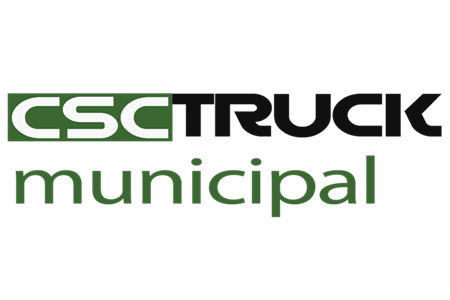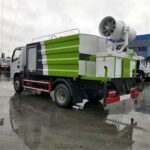Water spray trucks play a crucial role in a wide range of industries, from construction and road maintenance to agriculture and fire control. These versatile vehicles are designed to distribute water effectively and efficiently, helping to control dust, suppress fires, and provide irrigation, among other tasks. However, like any machinery, water spray trucks require proper care and maintenance to ensure they continue to operate at their best and deliver optimal water distribution. In this article, we will delve into the key aspects of water spray truck care to maintain their performance and extend their lifespan.
Regular Inspection and Cleaning
One of the fundamental steps in water spray truck maintenance is conducting regular inspections and thorough cleaning. Due to their exposure to various environments and substances, these trucks can accumulate dirt, debris, and contaminants that might hinder their functionality. Regular inspections allow operators to identify any signs of wear, leaks, or corrosion early on, preventing small issues from escalating into major problems.
Cleaning the water tanks, spray nozzles, filters, and hoses is crucial to ensure the delivery of clean and uncontaminated water. Neglecting proper cleaning can lead to clogged nozzles, reduced water pressure, and uneven water distribution. Use appropriate cleaning agents and methods recommended by the manufacturer to prevent damage to sensitive components.
Maintenance of Spray Nozzles
The spray nozzles are the heart of a water spray truck, determining the pattern, intensity, and evenness of water distribution. These nozzles are subject to wear and tear due to continuous use and exposure to water pressure. To maintain optimal water distribution, it’s essential to inspect, clean, and replace nozzles as needed. Clogged or worn-out nozzles can result in uneven spray patterns and wasted water, ultimately affecting the truck’s efficiency and the success of the task at hand.
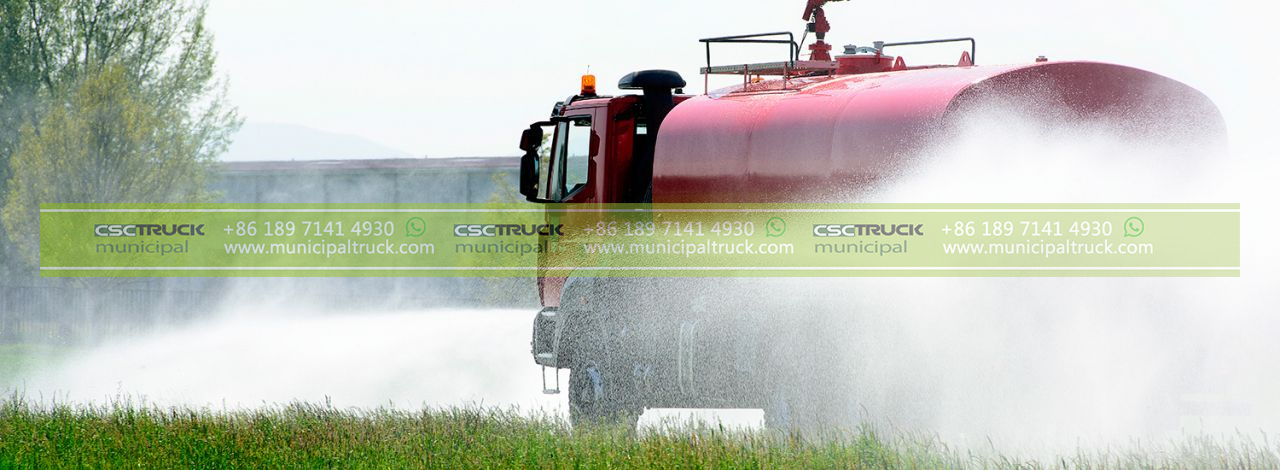
Water Pump Maintenance
The water pump is another critical component of a spray truck that requires regular maintenance. This pump is responsible for creating the necessary pressure to propel water through the hoses and nozzles. Check the pump’s performance regularly, looking for signs of reduced pressure or unusual noises. Lubricate the pump as recommended by the manufacturer and replace worn-out parts promptly. Proper pump maintenance ensures consistent water pressure and distribution, contributing to effective operations.
Hose and Connector Checks
Inspecting hoses, connectors, and fittings is a preventive measure that can save you from unexpected failures during operations. Hoses are subjected to bending, twisting, and exposure to the elements, making them susceptible to leaks or damage. Ensure that hoses are securely connected and free from cracks, and replace any damaged parts immediately. Adequate hose maintenance guarantees a steady flow of water without leaks or interruptions.
Electrical System and Controls
Modern water spray trucks often come equipped with advanced control systems and electrical components that facilitate precise water distribution. Regularly inspect the electrical wiring, switches, and control panels to ensure they are functioning correctly. Clean and protect these components from water damage and environmental factors that could compromise their performance. If your water spray truck has an automated control system, calibrate it periodically to maintain accurate water distribution settings.

Proper Storage and Transportation
When not in use, water spray trucks should be stored in a suitable environment that protects them from extreme weather conditions and potential vandalism. Proper storage helps prevent rust and corrosion, which can affect the truck’s components and paintwork. If the car needs to be transported over long distances, ensure it is securely fastened to the transport vehicle to prevent damage during transit.
Manufacturer’s Guidelines
Perhaps the most critical aspect of water spray truck care is following the manufacturer’s guidelines for maintenance and operation. Manufacturers provide detailed manuals outlining recommended maintenance schedules, lubrication points, and other essential instructions. Adhering to these guidelines not only ensures optimal performance but also helps maintain warranties and extends the lifespan of the equipment.
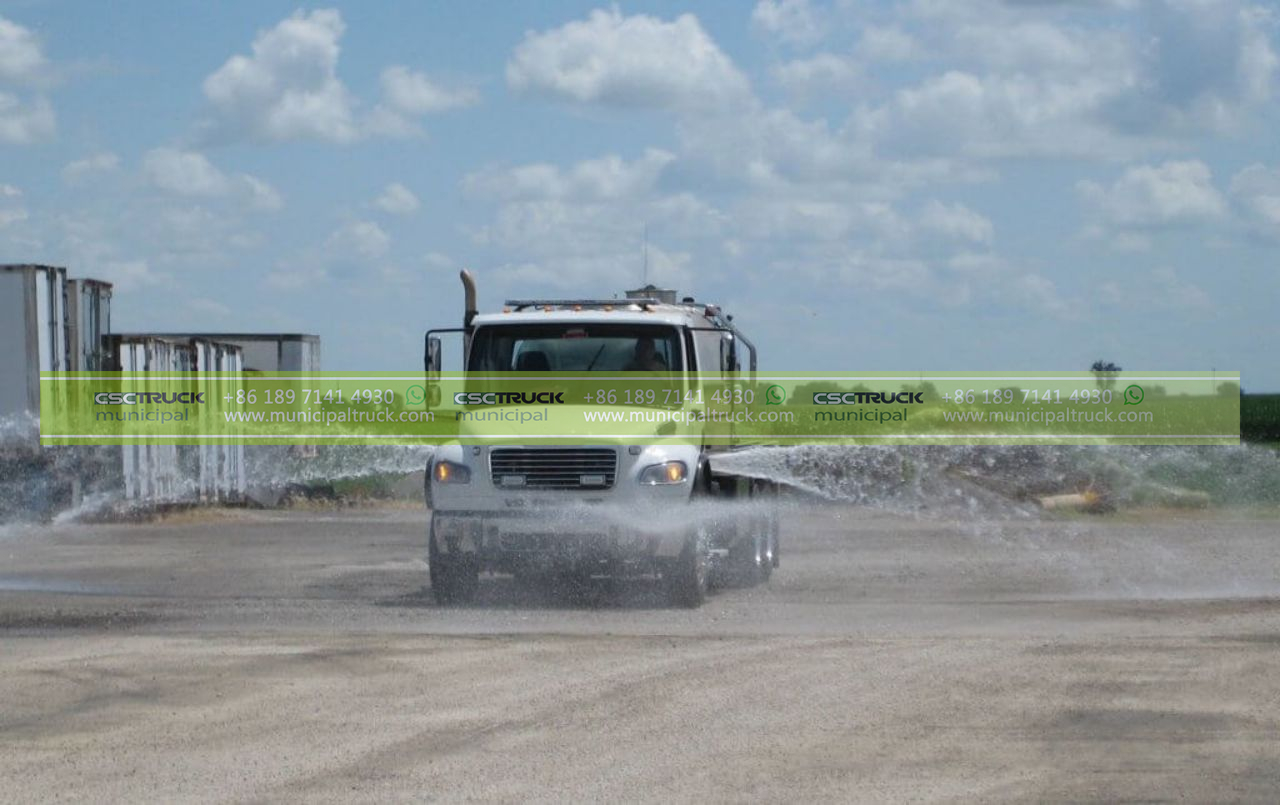
Environmental and Operational Benefits
Beyond the immediate benefits of maintaining optimal water distribution and extending the lifespan of water spray trucks, there are broader advantages that ripple through various industries and the environment.
1. Resource Efficiency: Proper water distribution through well-maintained spray nozzles and systems ensures that water is used efficiently. In industries like agriculture, where water is a precious resource, minimizing wastage through even distribution can contribute to water conservation and cost savings.
2. Air Quality and Dust Control: Water spray trucks are often employed in construction and road maintenance to suppress dust particles that can be harmful to both workers and the environment. Well-maintained trucks with functional spray nozzles ensure effective dust suppression, improving air quality and reducing health risks.
3. Fire Control: In firefighting efforts, water spray trucks play a vital role in controlling and extinguishing fires. Regular maintenance ensures that these vehicles are ready to respond promptly to emergencies, helping protect lives, property, and ecosystems.
4. Enhanced Productivity: Uneven water distribution due to neglect of maintenance can lead to rework and reduced efficiency in various tasks. By maintaining optimal water distribution, operators can enhance productivity and achieve desired results in a shorter time frame.
5. Sustainability: As industries and communities worldwide place greater emphasis on sustainability, well-maintained water spray trucks contribute to these efforts. By ensuring these vehicles operate efficiently, organizations reduce their carbon footprint and environmental impact.
Challenges and Solutions
While the benefits of proper water spray truck maintenance are evident, challenges can arise in implementing consistent care routines. One common challenge is time constraints, especially in industries where equipment is in constant use. To address this, organizations can establish maintenance schedules that align with downtimes or seasonal breaks.
Another challenge is the lack of trained personnel for maintenance. In such cases, organizations can invest in training programs or collaborate with service providers that specialize in water spray truck maintenance. Outsourcing maintenance can be a cost-effective solution that ensures expert care for the vehicles.
The Future of Water Spray Truck Care
As technology continues to advance, the field of water spray truck maintenance is not exempt from innovation. Manufacturers are likely to develop more efficient and user-friendly systems, making maintenance tasks more streamlined. This might include smart sensors that provide real-time data on the truck’s performance, predictive maintenance algorithms that anticipate component failures, and remote monitoring capabilities that allow operators to oversee maintenance tasks from a distance.
Furthermore, sustainability concerns will drive the development of water spray trucks that are not only efficient in water distribution but also environmentally conscious in terms of fuel consumption and emissions. These advancements will be accompanied by updated maintenance protocols to match the evolving technology.
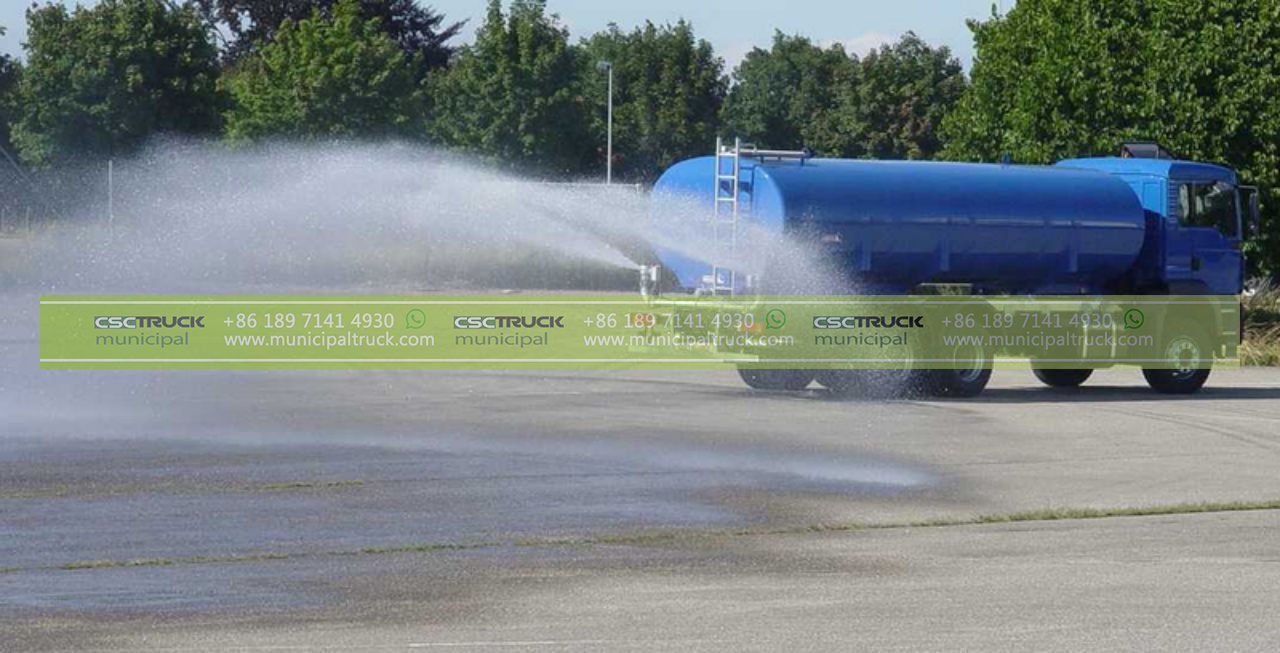
In Conclusion
Water spray trucks are versatile workhorses that contribute to a variety of industries. Their ability to distribute water effectively and efficiently is crucial for tasks ranging from dust suppression to firefighting. By prioritizing regular maintenance, operators ensure that these vehicles continue to operate at peak performance, providing the even water distribution required for successful outcomes.
Maintaining optimal water distribution involves inspecting and cleaning components such as spray nozzles, hoses, pumps, and electrical systems. Following the manufacturer’s guidelines and recommended maintenance schedules is essential for both operational efficiency and prolonging the lifespan of water spray trucks. In doing so, operators not only reap immediate benefits in terms of resource efficiency, air quality improvement, and enhanced productivity but also contribute to broader sustainability goals.
As industries evolve and technology advances, the field of water spray truck care will continue to develop, incorporating innovations that make maintenance tasks more effective and convenient. By staying updated on these developments and adapting maintenance practices accordingly, operators can ensure that their water spray trucks remain indispensable assets for years to come.
Contact us for this municipal truck or similar trucks: [email protected] Call us or What's APP us: +86 189 4292 3930
